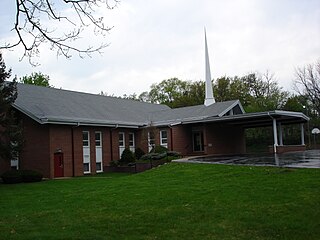The Evangelical Lutheran Church in America (ELCA) is a mainline Protestant Lutheran church headquartered in Chicago, Illinois. The ELCA was officially formed on January 1, 1988, by the merging of three Lutheran church bodies. As of 2022, it has approximately 2.9 million baptized members in 8,640 congregations.

The Church of the Lutheran Brethren of America (CLBA) is a Lutheran denomination of Christians rooted in a Pietist Lutheran spiritual awakening at the turn of the 20th century.
Confessional Lutheranism is a name used by Lutherans to designate those who believe in the doctrines taught in the Book of Concord of 1580 in their entirety. Confessional Lutherans maintain that faithfulness to the Book of Concord, which is a summary of the teachings found in Scripture, requires attention to how that faith is actually being preached, taught, and put into practice. Confessional Lutherans believe that this is a vital part of their identity as Lutherans.

The Apostolic Lutheran Church of America (ALCA) is a Laestadian Lutheran church denomination established by Finnish American and Norwegian immigrants in the 1800s. They came mainly from northern Finland and northern Norway where they had been members of the state churches. Most or all members had ties from their home countries to the Laestadian revival movement named after Swedish state church administrator and pastor Lars Levi Laestadius of Pajala, Sweden. Eventually, there were too many arguments between this denomination and the other American Laestadians, and some of the followers of Laestadius were excluded from the sacrament of holy communion. Under the lead of Salomon Korteniemi, the excluded members formed a congregation of their own in December 1872, under the name the Salomon Korteniemi Lutheran Society. In 1879 this name was changed to the Finnish Apostolic Lutheran Congregation. As other congregations of Finns in Massachusetts, Michigan, Minnesota, and Oregon were organized on the same basis, they came into fellowship with this body under the name the Finnish Apostolic Lutheran Church, or, as it is usually called, the Apostolic Lutheran Church.

The Evangelical Lutheran Free Church is a confessional Lutheran denomination based in Germany and Austria. It currently consists of 1,300 members in 17 congregations. The ELFK maintains a seminary for the training of pastors in the city of Leipzig.

Eucharistic discipline is the term applied to the regulations and practices associated with an individual preparing for the reception of the Eucharist. Different Christian traditions require varying degrees of preparation, which may include a period of fasting, prayer, repentance, and confession.

The Netherlands Reformed Congregations is a conservative Calvinist denomination with congregations in Canada, the United States and Bolivia. It is affiliated with the Reformed Congregations in the Netherlands.
The Evangelical Synod of North America, before 1927 German Evangelical Synod of North America, in German (Deutsche) Evangelische Synode von Nord-Amerika, was a Protestant Christian denomination in the United States existing from the mid-19th century until its 1934 merger with the Reformed Church in the United States to form the Evangelical and Reformed Church. This church merged with the Congregational Christian Churches in 1957 to create the United Church of Christ.

Bernt Julius Muus was a Norwegian-American Lutheran minister and church leader. He helped found St. Olaf College, a private liberal arts college in Northfield, Minnesota.
Sven Oftedal was a Norwegian American Lutheran minister. He served as the 3rd president of Augsburg University and helped found the Lutheran Free Church.
In Christianity, an elder is a person who is valued for wisdom and holds a position of responsibility and authority in a Christian group. In some Christian traditions an elder is an ordained person who serves a local church or churches and who has been ordained to a ministry of word, sacrament and order, filling the preaching and pastoral offices. In other Christian traditions, an elder may be a lay person serving as an administrator in a local congregation, or be ordained and serving in preaching or pastoral roles. There is a distinction between ordained elders and lay elders. The two concepts may be conflated in everyday conversation. In non-Christian world cultures the term elder refers to age and experience, and the Christian sense of elder is partly related to this.
Lutheranism is a major branch of Protestantism, identifying primarily with the theology of Martin Luther, the 16th-century German monk and reformer whose efforts to reform the theology and practices of the Catholic Church launched the Protestant Reformation.
The Lutheran sacraments are "sacred acts of divine institution". Lutherans believe that, whenever they are properly administered by the use of the physical component commanded by God along with the divine words of institution, God is, in a way specific to each sacrament, present with the Word and physical component. They teach that God earnestly offers to all who receive the sacrament forgiveness of sins and eternal salvation. They teach that God also works in the recipients to get them to accept these blessings and to increase the assurance of their possession.

A sacrament is a Christian rite that is recognized as being particularly important and significant. There are various views on the existence, number and meaning of such rites. Many Christians consider the sacraments to be a visible symbol of the reality of God, as well as a channel for God's grace. Many denominations, including the Roman Catholic, Lutheran, Presbyterian Anglican, Methodist, and Reformed, hold to the definition of sacrament formulated by Augustine of Hippo: an outward sign of an inward grace, that has been instituted by Jesus Christ. Sacraments signify God's grace in a way that is outwardly observable to the participant.

United Methodist Church in Norway is an annual meeting of the United Methodist Church covering Norway. It consists of 46 congregations and had 10,684 members in 2014.
Bernt Berntsen Lomeland was a Norwegian school teacher and lay minister who established The Community (Samfundet) in 1890.

The General Lutheran Church, Inc. (GLC) is a small Lutheran denomination organized on March 9, 2014, and incorporated in the state of Indiana on October 26, 2017. The address of incorporation passed to Puerto Rico when the church changed leadership. It was founded when ministers of several Lutheran church bodies who objected to various positions held in their respective churches, specifically regarding atonement, women's ordination, worship styles, and the Lutheran Confessions, met to discuss these and other issues of concern. This meeting led to the establishment of the General Lutheran Church and to its endorsement of universal salvation, women's ordination, and flexibility with regards to liturgical matters. The church claims to be a successor to the former Evangelical Lutheran General Synod of the United States of America.
Per Gravdal, later Peder Olsen Nodland (1842–1909) was a Norwegian pastor and founder of the Christian denomination Det Almindelige Samfund, one of the churches that came from the Strong Believer movement in opposition to the Haugeans. Gravdal served as its pastor for eight years from 1901 to 1909.
The Strong Believers is a theologically conservative Norwegian Christian movement, with roots in the Lutheran Church of Norway, in opposition to the Haugean movement. They split from the Church of Norway in 1890.
Knud Kittelsen Spødervold was a Norwegian author and lay preacher and leader of the Strong Believers, a theologically conservative Norwegian Christian movement in opposition to the Haugean movement, with roots in the Lutheran Church of Norway.








